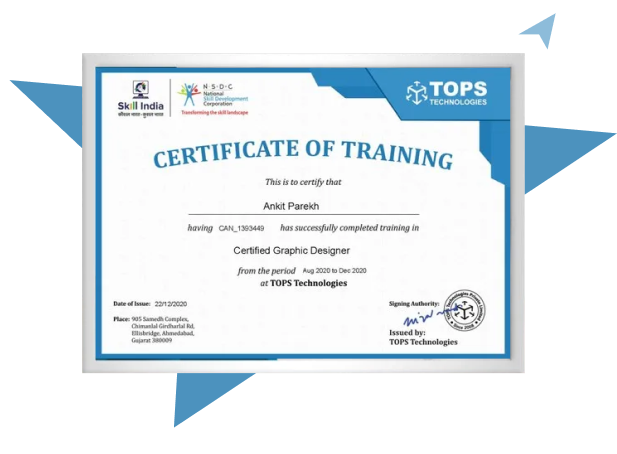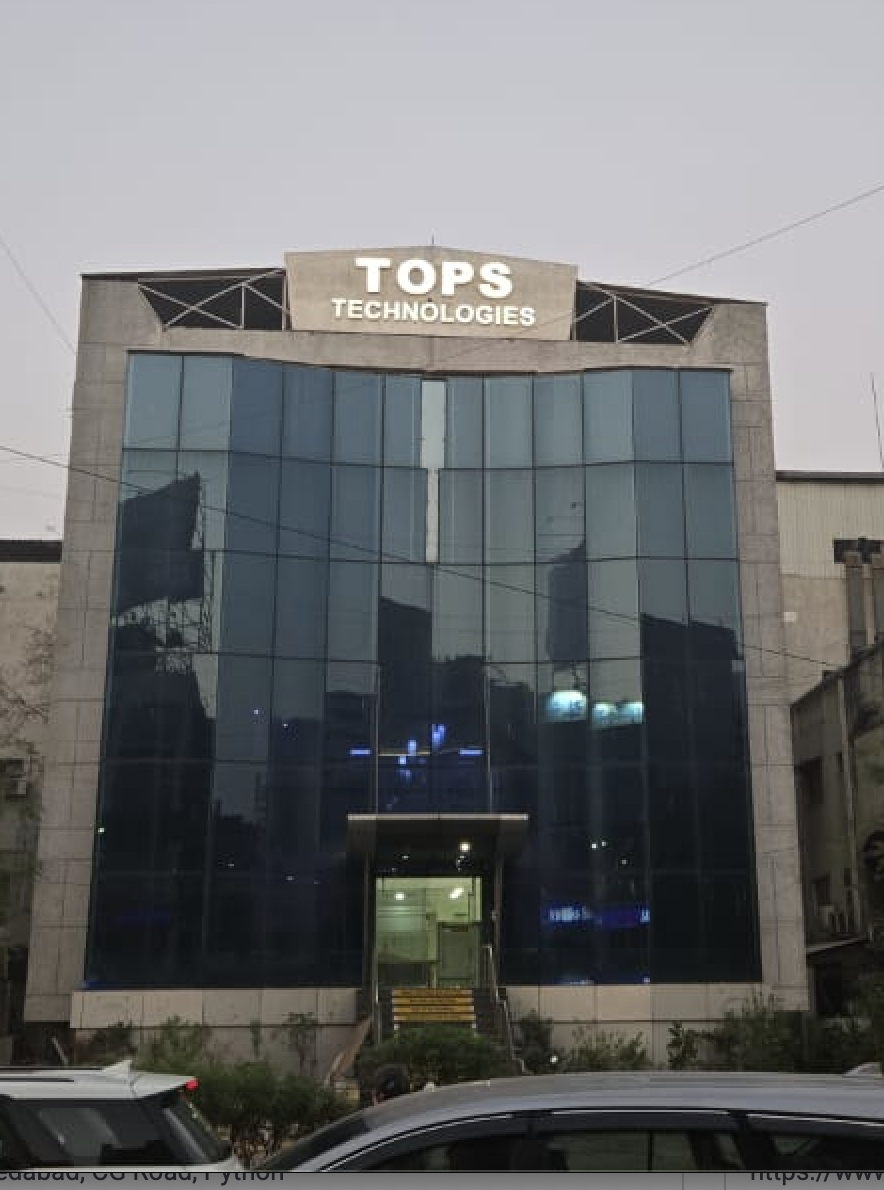Our Facts and Figures
1 Lac+
Student Placed
3000+
Companies TieUp
19+
Offices in India
50+
Industry Courses
Get 100% Job Assistance by enrolling in Certified C, C++ Training Course
Key Highlights
Limited Students Batch
Personalised Attention
Highly Qualified Teachers
Flexible Batch Timings
Interactive Learning
Live Projects
Career Support
Job Oriented Training
C, C++ Course Highlights
Career-Defining C and C++ Training for Freshers and Corporates
Get the best understanding to implement codes in C and C++ with TOPS at Gandhinagar. This course is designed to prepare students and professionals from any field to land a career-defining job upon the completion of this course. Our subject expert at TOPS kick-start this course by introducing you to the references, their uses, and gradually move towards the key features of C++ programming. The structure of C, C++ course offers a unique opportunity to learn on the fly with real-time problems and solutions.
The TOPS training center at Gandhinagar is an expert in introducing students to live projects. As the course move towards a conclusion, the students are expected to pick up the basic and advanced skills that make them job ready. This is made possible by teaching them the implementation of the concepts like inheritance, class creation that inherit behavior from other classes and also about polymorphism.
TOPS has successfully scaled-up the lives of over 10,000 students since its inception. The commitment from the management and the faculties are driven to create a more learned workforce for the IT industry. We also provide the placement assistance blends with course-curriculum to help find the right company and placement for the talent that is nurtured in-house.
If you to wish to redefine your career with this C, C++ course, visit our TOPS center in Gandhinagar to attend a risk-free demo session for the same.
Personalized sessions for students and professionals
TOPS can certainly provide the personalized training sessions for C, C++ course to college going students and working professionals. Our C and C++ instructors are readily available to impart the best of their knowledge at your offices or colleges/institutes in Gandhinagar. For more information, email us at inquiry@tops-int.com.
40%
Average Salary Hike
4.5 Lacs
Highest Salary
3000+
Hiring Partners
Join Our Free Upcoming Webinar
How AI Is Transforming Data Analysis in 2026
06 Feb 2026, 04:00 PM
Trainer
Kaushal Kalariya
(Sr. Technical Trainer)
Full Stack Development
07 Feb 2026, 11:00 AM
Trainer
Jigar Thakkar
(Sr. Technical Trainer)
Agentic AI vs Generative AI
07 Feb 2026, 03:00 PM
Trainer
Dhrumil Joshi
(Sr. Technical Trainer)
C, C++ Course Curriculum
Download Curriculum- Introducation Of C
- C History
- Structure of C programming
- Keyword and identifier
- Rules for identifiers
- Variable in C
- Declaration of variable
- Constants in C
- Real constant
- Integer constant
- Character constant
- String constant
- Data types
- Managing input and output operations
- single character input
- Declaration of storage classes
- Types of storage classes
- Auto storage class
- Register storage class
- Static storage class
- External storage class
- Defining symbolic constants
- Volatile variable
- Types of operator
- Assignment
- Arithmetic
- Logical
- Relational
- Shorthand
- Unary
- Conditional
- Size of operator
- Type conversation
- Implicit conversation
- Explicit conversation
- Decision making
- Branching
- Control statements
- If statement
- If else statement
- Nested if statement
- Else if ladder statement
- Switch statement
- Break statement
- Iteration
- Type of Loops
- While loop
- Do…while loop
- For loop
- Jumping statement
- GoTo statement
- Break statement
- Continue statement
- Array
- Declaration of array
- Initialization of array
- Multi-dimensional of array
- string in C
- Initializing in C
- Reading string from terminal
- String operations
- String input and output
- Functions
- Type of function
- Built-in function User Defined function
- Recursive function
- Structure and union
- Pointers
- Address operator
- Pointer arithmetic
- Pass by value
- pass by reference
- Pointers to array
- Dynamic memory allocation
- Linked list
- file handling
- pre-processor
- command line argument
- History of C++
- Structure of c++
- Comments
- keywords
- identifiers
- scope of variable
- Declaration of variable
- constants
- Data types
- Integer data type
- Float data type
- Character data type
- Storage classes
- Automatic
- External
- Static
- Operators
- C++ character functions
- Array
- Null-terminated string
- OOP’s feature
- class
- object
- Data
- Data hiding
- Encapsulation
- Inheritance
- Polymorphism
- Overloading
- Member function
- Inline function
- Constructor and destructor
- Data hiding
- Inheritance
- polymorphism and overloading
- Virtual functions
- Friend functions
- Static
- Memory management
- Command line argument
- Templates
- File I/O
Our TOPS Training Centers in India
Course Key Features
Course – C
- Understand the Fundamentals of C Programming Language
- Learn how to write high-quality code
Course - C++
- Learn C++ From the basics to Advance Concepts
- Learn from Industry Experts
- Hands on Practical Concepts
Skills Covered
Course – C
- C Language
- Structure of C
- Operators in C
- Decision Making And Flow Control
- User Defined Functions
- Derived Datatypes
- File Handling in C
- Preprocessors and Header Files
- Type Casting
- Error Solving in C
- Recursive Functions
- Memory Management
- Command Line Arguments
- Macros and Linked List
Course C++
- C++ Language
- Keywords and Identifiers
- Variable and Constant in C++
- Data Types and Storage Class
- Operators
- C++ Character Functions
- Array
- OOPS
- Member and Inline functions
- Constructors and Destructors
- Inheritance
- Polymorphism
- Friend function
- Memory Management
Job Roles
Course – C
- C Programmer
- Software Engineer
- Software Developer
Course C++
- C++ Developer
- CPP Developer
- Software Engineer
- Software Developer
Get Training Certificate by Government
Recognized NSDC/Skill India

- National Skill Development Corporation
- Supported by the vision of PM Shri Narendra Modi
- Certification by NSDC SkillIndia
- Valid for all Jobs and College Training
- International Recognition

Student Reviews
Darshan Navadiya
I have done training from TOPS Technologies in c,c++ overall good experience! and this training is helped me i...
Read MoreSanket Makwana
I love to join Tops Technologies. Grateful experience with this institute in learning new things in C, C++.
Read MoreNachiketa Pathak
Good Teaching in C, C++ Programming. Support from faculty is very helpful to solve your all doubts. Very good...
Read MoreDeval B Patel
Here Faculty members are very friendly with us and their knowledge is also good in C, C++ Course. Thank you To...
Read MoreNeha M Mordia
I had a great experience at Tops Technologies during Training period. Training, theorical knowledge in C, C++...
Read MoreZabihullah
I am very happy from Tops Technologies. I am very thankful to my teacher for teaching me very good C, C++ .
Read MoreNilay Vyas
It was good Teaching in C, C++. Faculties are very supportive to every one throughout the journey at TOPS Tech...
Read MoreFAQ
C++ uses streams for I/O:
- cin is used to take input from the standard input device (keyboard).
- cout outputs data to the console.
- Both are part of the iostream library and allow type-safe, formatted data handling.
Header files contain declarations for functions, classes, constants, and macros. They promote modularity and code reuse. By including them, you prevent redundancy and maintain organized code.
The #include directive instructs the preprocessor to include the contents of a file into the program before compilation. It helps incorporate standard or user-defined code and functions into the source file.
This line tells the compiler to use the standard namespace, allowing you to avoid writing std:: before standard library components like cout, cin, and endl, making the code cleaner and easier to read.
- break exits a loop or switch statement entirely.
- continue skips the current iteration and proceeds to the next one.
- They help in controlling the flow of loops based on conditions.
Yes. C++ has a robust exception handling system using try, catch, and throw. It allows you to manage runtime errors in a structured way, making programs more reliable and easier to debug.
C++ supports:
- Single-line comments using //
- Multi-line comments using /* */
- Comments improve code readability and help document logic
No. The compiler and linker require a single main() function to determine where program execution should begin. Defining more than one main() will lead to compilation or linking errors.
C++ supports multiple programming paradigms:
- Procedural programming
- Object-Oriented Programming (OOP)
- Generic programming through templates
- This flexibility allows developers to choose the most suitable paradigm for the task.
The main() function serves as the starting point of any C++ program. It defines the execution flow and can return an exit status to the operating system, indicating whether the program ended successfully.
Interview Questions
C++ is a powerful and flexible general-purpose programming language that builds upon the C language by introducing object-oriented features. Developed by Bjarne Stroustrup, it supports multiple programming paradigms, including procedural, object-oriented, and generic programming. This versatility allows developers to write efficient, maintainable, and scalable software. C++ is widely used in system programming, game development, embedded systems, and performance-critical applications due to its speed and low-level capabilities.
C++ offers several built-in data types that serve as the foundation for all variables and expressions. These include:
- int for integers,
- float for single-precision decimal numbers,
- double for double-precision decimals,
- char for single characters, and
- bool for boolean values (true/false).
Beyond these, C++ supports derived types (like arrays, functions, and pointers) and user-defined types such as structures, classes, and unions. These data types help create complex data structures and support varied programming needs.
While both C and C++ are rooted in system-level programming, C is a procedural programming language focused on functions and structured programming. C++, on the other hand, introduces object-oriented programming (OOP), enabling the creation of reusable and modular code through classes, inheritance, and polymorphism. C++ retains the features of C while adding abstraction, encapsulation, and robust type-checking, making it suitable for both high-level applications and low-level system programming.
A class is a blueprint or template that defines the properties (data members) and behaviors (member functions) of a group of similar objects. An object is an instance of a class, representing a concrete entity with specific values and behaviors. Classes help organize code logically and promote code reuse through abstraction and encapsulation.
What is the purpose of constructors and destructors in C++?
- Constructors are special functions that are automatically invoked when an object is created. They initialize object data members and can be overloaded to handle different initialization scenarios.
- Destructors, on the other hand, are automatically called when an object goes out of scope or is deleted. Their purpose is to release resources, such as memory or file handles, and perform cleanup operations to ensure the program runs efficiently.
A pointer is a variable that stores the address of another variable. It enables efficient data manipulation, dynamic memory management, and is crucial in building complex data structures like linked lists and trees.
Function overriding occurs when a derived class redefines a virtual function of its base class with the same name, return type, and parameters. It enables runtime polymorphism and allows custom behavior in subclasses.
An inline function suggests the compiler replace the function call with the actual function code, reducing overhead for small, frequently called functions. Declared using the inline keyword.
- Call by Value: A copy of the argument is passed to the function. Changes inside the function don’t affect the original value.
- Call by Reference: The address of the variable is passed, allowing the function to modify the original variable directly.
Dynamic memory allocation refers to allocating memory at runtime using new (or malloc). It allows flexible use of memory for structures like arrays, especially when the size isn't known at compile time.









